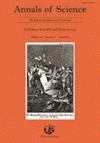温和的宿命论:达尔文时代的科学、伊斯兰教和自由意志辩论
IF 0.9
3区 哲学
Q2 HISTORY & PHILOSOPHY OF SCIENCE
引用次数: 0
摘要
19世纪关于科学与宗教关系的辩论的一个重要方面涉及科学家中确定性观点的流行。作为孔特实证主义的一个组成部分,决定自然和社会现象的不可变定律在达尔文时代成为科学观点中越来越普遍的组成部分。批评者将这种倾向称为“科学宿命论”,并将其比作加尔文主义的宿命论,后者将这场辩论转变为关于基督教不同分支的争论。本文关注这场辩论中被忽视的一个方面,即提及伊斯兰教和土耳其人在其中所起的作用。“穆罕默德宿命论”已经是殖民主义辩护中的一个常见主题,但很快就成为了谴责新科学观点的工具。通过比较法国、英国和美国关于这一主题的著作,本文表明,尽管出现了赞扬穆斯林宿命论的方法,同时为科学决定论辩护,但大多数科学家和思想家都诉诸于谴责穆斯林的宿命论,以区分他们的观点,本文论证了政治和宗教话语在维多利亚时代科学话语的形成过程中是如何发挥重要作用的。本文章由计算机程序翻译,如有差异,请以英文原文为准。
Kindred fatalisms: debating science, Islam, and free will in the Darwinian era
ABSTRACT An important aspect of the nineteenth century debate on the relationship between science and religion concerned the popularity of deterministic views among scientists. An integral part of Comte's positivism, the idea of immutable laws that determined natural and social phenomena became an increasingly prevalent component of scientific perspectives in the Darwinian era. Referring to this tendency as ‘scientific fatalism,’ critics likened it to Calvinist predestination, which transformed the debate into one involving polemics about different branches of Christianity as well. This paper focuses on a neglected aspect of this debate, namely, the role that references to Islam and Turks played in it. ‘Mohammedan fatalism,’ already a common theme in justifications of colonialism, promptly became a tool with which to condemn new scientific views. Comparing French, British, and American writings on the topic, the paper illustrates that while there emerged approaches that praised the fatalism of Muslims while making a case for scientific determinism, most scientists and thinkers resorted to condemning the fatalism of Muslims in order to distinguish their views from it. In this respect, the paper demonstrates how political and religious discourses played a significant part in the shaping of scientific discourse in the Victorian era.
求助全文
通过发布文献求助,成功后即可免费获取论文全文。
去求助
来源期刊

Annals of Science
综合性期刊-科学史与科学哲学
CiteScore
0.80
自引率
0.00%
发文量
22
审稿时长
1 months
期刊介绍:
Annals of Science , launched in 1936, publishes work on the history of science, technology and medicine, covering developments from classical antiquity to the late 20th century. The Journal has a global reach, both in terms of the work that it publishes, and also in terms of its readership. The editors particularly welcome submissions from authors in Asia, Africa and South America.
Each issue contains research articles, and a comprehensive book reviews section, including essay reviews on a group of books on a broader level. Articles are published in both English and French, and the Journal welcomes proposals for special issues on relevant topics.
The Editors and Publisher are committed to supporting early career researchers, and award an annual prize to the best submission from current doctoral students, or those awarded a doctorate in the past four years.
 求助内容:
求助内容: 应助结果提醒方式:
应助结果提醒方式:


